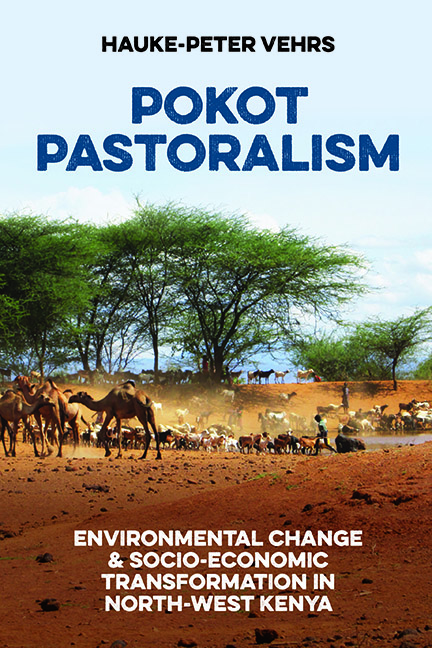Book contents
- Frontmatter
- Dedication
- Contents
- List of Illustrations
- Preface and Acknowledgements
- List of Abbreviations
- 1 Introduction
- 2 East Pokot: A Place and its People
- 3 Pokot Pastoral Livelihoods
- 4 The Paka Community
- 5 Environmental Changes in East Pokot
- 6 Socio-Ecological Transformations in the Agro-Pastoral Highlands
- 7 Ecological Change and Local Livelihoods: Scientific and Pokot Perspectives
- 8 Ecological Invasions: Agents of Socio-Ecological Transformation
- 9 Ecological Challenges and Social Transformations
- Appendix: Lists of Plant Names (Pokot–Scientific and Scientific–Pokot)
- Bibliography
- Index
- Future Rural Africa
9 - Ecological Challenges and Social Transformations
Published online by Cambridge University Press: 16 July 2022
- Frontmatter
- Dedication
- Contents
- List of Illustrations
- Preface and Acknowledgements
- List of Abbreviations
- 1 Introduction
- 2 East Pokot: A Place and its People
- 3 Pokot Pastoral Livelihoods
- 4 The Paka Community
- 5 Environmental Changes in East Pokot
- 6 Socio-Ecological Transformations in the Agro-Pastoral Highlands
- 7 Ecological Change and Local Livelihoods: Scientific and Pokot Perspectives
- 8 Ecological Invasions: Agents of Socio-Ecological Transformation
- 9 Ecological Challenges and Social Transformations
- Appendix: Lists of Plant Names (Pokot–Scientific and Scientific–Pokot)
- Bibliography
- Index
- Future Rural Africa
Summary
The history of the pastoral Pokot, their formation in the eighteenth century, their specialisation in the nineteenth century and their diversification in the twentieth century demonstrate their capacity to deal with and respond to changing circumstances in several ways. Contrary to the often assumed resistance to change (Schneider, 1959), Oesterle describes the profound and rapid changes of pastoralism in East Pokot that ‘transformed from specialised, highly mobile and subsistence-oriented cattle herding to largely sedentary and market-oriented keeping of small-stock’ (Oesterle, 2008, p. 81) in the first decade of the twenty-first century. He illustrates the trend towards economic diversification of livelihoods, sedentarisation of former mobile households and a social stratification of Pokot communities. Oesterle highlights two important trends: first, the shifting focus from a cattle-oriented mobile pastoralism to a more sedentary form of small stock husbandry; second, the implementation of farming techniques in a formerly specialised pastoral group.
A trend Oesterle was not yet able to observe is the emergence of massive external interventions through development projects that have led to fundamental changes to the situation of the pastoral Pokot over a short period of time. Again, enormous landscape-level changes are looming on the horizon. Conservation projects aim to protect newly designated areas particularly at the fringes of Pokot territory (Greiner, 2016a), and large-scale geothermal energy production has the potential to revolutionise pastoral landscapes in the Pokot heartlands (Wetang’ula, 2017). The same is potentially true for other projects in the making in recent years, such as the discovery of oil in Turkana County (Johannes et al., 2014). Ferguson (2005) rightfully questions which characteristics such engagement by governmental and non-governmental actors in rural areas of the African continent might bring. The engagement of private companies in extracting minerals, or, as in this case, the development of a geothermal infrastructure and the generation of electricity by state actors, raises the question of whose interests are being pursued here and to what extent the interests of the local population can actually be represented and respected.
‘Development’ in East Pokot
From a government perspective, East Pokot was long treated marginally, and very few external influences were deployed in the region, as was also demonstrated in Chapter 3 describing the involvement of the churches in East Pokot, in terms of formal education, water infrastructure and agricultural measures, which were not supported by the state until the 1980s.
- Type
- Chapter
- Information
- Pokot PastoralismEnvironmental Change and Socio-Economic Transformation in North-West Kenya, pp. 181 - 203Publisher: Boydell & BrewerPrint publication year: 2022

